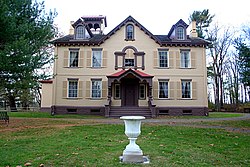Lindenwald
|
Lindenwald
Martin Van Buren National Historic Site |
|

Front of the house facing the Albany Post Road
|
|
| Location | Town of Kinderhook, Columbia County, New York |
|---|---|
| Nearest city | Kinderhook, New York |
| Coordinates | 42°22′10.94″N 73°42′15.14″W / 42.3697056°N 73.7042056°WCoordinates: 42°22′10.94″N 73°42′15.14″W / 42.3697056°N 73.7042056°W |
| Area | 125 acres (51 ha) |
| Built | 1841 |
| Architect | Peter Van Ness; Richard Upjohn |
| Architectural style | Federal; Gothic Revival |
| Visitation | 13,617 (2004) |
| Website | Martin Van Buren National Historic Site |
| NRHP Reference # |
66000510 (original) 12000406 (increase) |
| Significant dates | |
| Added to NRHP | October 15, 1966 |
| Boundary increase | July 11, 2012 |
| Designated NHL | July 4, 1961 |
| Designated NHS | October 26, 1974 |
Martin Van Buren National Historic Site is a unit of the United States National Park Service located 20 miles (32 km) south of Albany, New York, or two miles south of the village of Kinderhook, New York in Columbia County. The National Historic Site preserves the estate and thirty-six room mansion of Martin Van Buren, the eighth President of the United States. Van Buren purchased the estate, which he named Lindenwald, in 1839 during his one term as President and it became his home and farm during his retirement.
Van Buren, a founder of the Democratic Party, purchased the home and approximately 125 acres (51 ha) of land in 1839 for $14,000 (equal to $314,869 today) while he was still President. However, Van Buren did not move into the home until 1841 (after he was defeated for his second term by the Whig candidate William Henry Harrison in 1840). Eventually, his four living sons, Abraham, John, Martin Jr., and Smith, had rooms in the mansion. The home was previously owned by the Van Ness family and was where Washington Irving wrote most of his book A History of New York. Irving and Van Buren later became friends.
Van Buren ran two United States Presidential campaigns from Lindenwald. In 1844, he based his ultimately unsuccessful run for the Democratic nomination at the estate. That year, Van Buren lost a hotly contested fight to nominee and eventual President James Knox Polk. In 1848, in opposition to the extension of slavery into territories captured from Mexico as a result of the Mexican-American War, Van Buren ran for President on a third-party ticket (The Free Soil Party), again directing his campaign from Lindenwald. Van Buren's campaign drew enough votes away from the Democratic nominee, Lewis Cass, to allow Whig candidate Zachary Taylor to prevail.
...
Wikipedia


